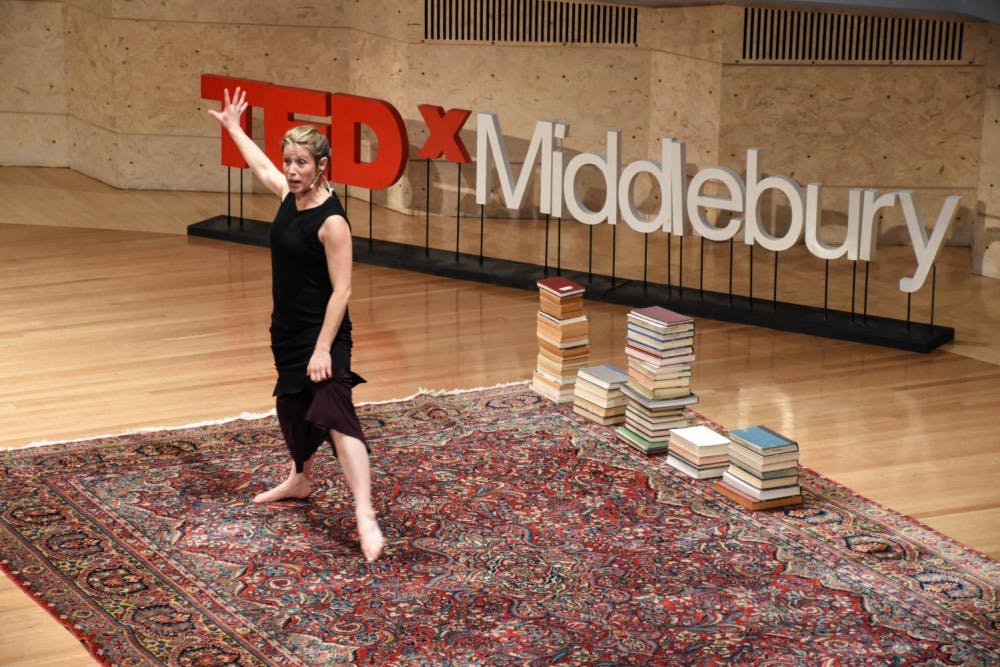What makes an idea worth sharing? TED, the global conference organization, addresses this question by inviting thousands of speakers to share their innovative ideas.
Last Sunday, the Middlebury campus was once again included in this confluence of thought during the annual TEDxMiddlebury, this year under the theme “Unhinged,” organized by Middlebury students following the TED model. Starting Sunday morning, attendees quickly packed the Mahaney Center’s Robison Hall for three engaging hours exploring a wide-ranging set of new ideas.
Six speakers covered six diverse topics united by their shared novelty. Rebecca Duras ’19 spoke about her struggles with mental health. Duras described the years of her life in which she worried not only about her mental health but also how it would define her. The thought that her relationship with her mental illness would always outlast any of her other relationships emerged as an insistent theme. Gradually, though, she began to realize the benefits of boldly accepting herself. In the end, Duras finally found a way to reframe her experience.
“I thought my relationship with mental illness would define me,” she said, “but in the end, my relationship with myself will be the longest in my life.”
Reframing is one of the methods last weekend’s speakers used to discover a new idea. Kelly Brush ’08 spoke of reframing her experience after a serious skiing accident seemingly ended her life-long passion for competing in the sport. Paralyzed from the chest down while at Middlebury, Bush had to come to terms with her new reality which included learning how to use a wheelchair and how to play adaptive sports.
Another type of new idea emerged at TEDx as well. Ahmed El-Geneidy, for instance, looked not at reframing reality but at finding novel solutions to existing problems. A Québécois urban planner, El-Geneidy discussed how the future of transportation is not self-driving cars but small, adaptive changes to encourage use of alternative transportation methods, like buses and bicycles.
Similarly, Sixto Cancel talked about his new approach to improving the foster care system. A foster child himself, Cancel learned firsthand how the foster care system largely ignores children’s needs for mentorship, stability and personal development. As an adult, Cancel found an opportunity to leverage the power of technology to fill this need. Now he runs several hackathons a year, during which people collaborate on intensive computer programming, to develop better ways to use technology to connect foster children with the mentors and support they need.
Taking a different approach, Karen Fondacaro brought a moral idea to the event. Fondacaro is a clinical psychologist who has worked within the criminal justice system as well as with immigrants, refugees and asylum seekers. She shared how at first she was afraid to work with a murderer, but that changed once she met him. Expecting a terrifying monster of a man, she was disarmingly surprised to find a very normal older person making her laugh for the duration of their session. She also talked about the horrific stories she heard from the migrants who have come to her organization, Connecting Cultures. For instance, she told the story of a Sudanese man who, after listing all the major events in his life including the murder of his father and other challenges of the civil war, reflected that he had forgotten how many good moments he has had as well. Fondacaro encapsulated her idea by simply saying “leaning in and listening is important.”
As Fondacaro’s talk proves, the event was not solely an intellectual gathering of new and exciting ideas. It was full of emotion: fear, joy, shame and courage, to name a few. It was cathartic.
Lida Winfield, a visiting dance professor, performed about her lifelong struggles with her learning difficulties. Not only was her story a moving one about working through years of shame and tribulation, but she presented it as a talk, a poem and a dance simultaneously.
She was not alone in moving the audience. Cancel explained how “Law and Order” inspired him to self-advocate to get the foster care he deserved before helping provide that care for others as well. Duras put on full display the boldness that she developed to respond to her struggles with mental health. Overall, the effect was eye-opening.
Ultimately, “eye-opening” is exactly what an event like this ought to be. Although we may be tucked in our small corner of Vermont, TEDxMiddlebury allowed the community to experience a larger world, intellectually, emotionally and physically. Last weekend’s conference thus successfully spread ideas worth sharing. With any luck, those ideas will seep through our community and begin to make our world a little bit better.
TEDxMiddlebury Speakers Define Struggles, Themselves

SILVIA CANTU BAUTISTA/ THE MIDDLEBURY CAMPUS
Professor Lida Winfield described her challenges with her learning disabilities through speech and dance.
Professor Lida Winfield described her challenges with her learning disabilities through speech and dance.
Comments



